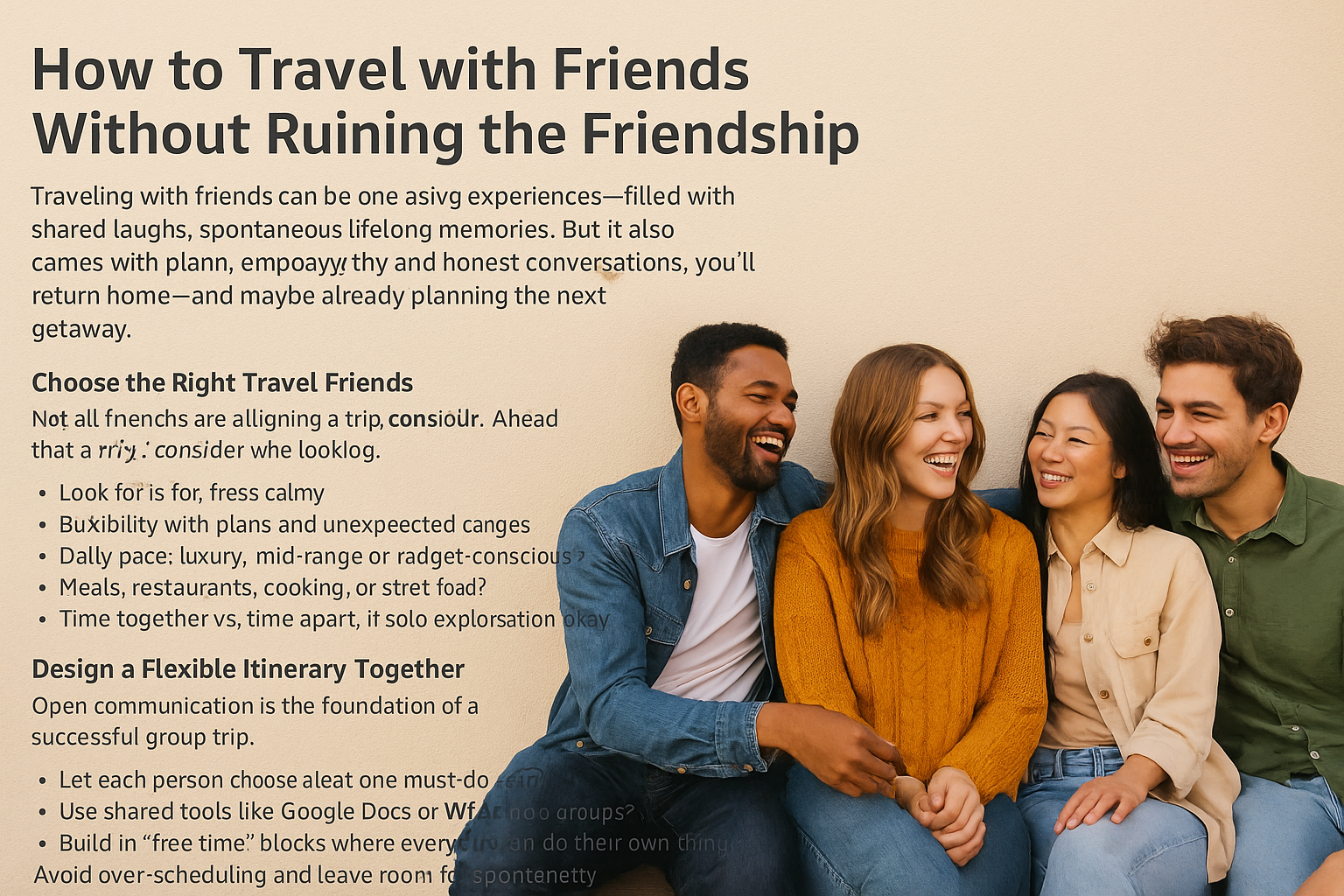Traveling with friends can be one of the most rewarding experiences—filled with shared laughs, spontaneous adventures, and lifelong memories. But it also comes with challenges. Differences in habits, expectations, and communication can lead to tension if not managed well.
This guide will help you plan and enjoy a trip with friends that brings you closer together, not apart. With some planning, empathy, and honest conversations, you’ll return home with stronger bonds—and maybe already planning the next getaway.
Choose the Right Travel Friends
Not all friendships are travel-compatible, and that’s okay. Before planning a trip, consider whether your travel styles are aligned.
Look for friends who:
- Handle stress calmly
- Are flexible with plans and unexpected changes
- Communicate clearly and respectfully
- Share similar interests and energy levels
- Respect boundaries and personal space
Even your best friend in daily life might not be your ideal travel buddy. Choose with care.
Talk About Expectations Before You Go
Open communication is the foundation of a successful group trip. Before booking anything, sit down and talk honestly.
Key things to discuss:
- Trip goals: relaxation, sightseeing, adventure, partying?
- Budget: luxury, mid-range, or budget-conscious?
- Daily pace: early mornings or late starts?
- Meals: restaurants, cooking, or street food?
- Time together vs. time apart: is solo exploration okay?
Aligning expectations early prevents disappointment later.
Design a Flexible Itinerary Together
Planning a trip with multiple people requires compromise. Make space for everyone’s interests.
How to plan fairly:
- Let each person choose at least one must-do activity
- Use shared tools like Google Docs or WhatsApp groups to organize ideas
- Build in “free time” blocks where everyone can do their own thing
- Be okay with splitting up occasionally if interests differ
Avoid over-scheduling and leave room for spontaneity.
Be Honest About Budgets
Money can quickly become a source of tension. Address finances before the trip—not during it.
Tips for money harmony:
- Agree on total trip costs and daily spending limits
- Decide how expenses will be split (evenly or based on income)
- Use apps like Splitwise or Venmo to keep things fair and transparent
- Be honest if a certain activity or restaurant is outside your budget
No friend should feel pressured to spend beyond their means.
Respect Different Travel Habits
You might be an early riser, while your friend loves to sleep in. One might love shopping, while another prefers museums.
How to balance differences:
- Don’t take it personally if your friend needs alone time
- Rotate who picks the day’s activities
- Be mindful of noise in shared rooms
- Support each other’s travel styles, even if they differ from yours
Compromise doesn’t mean giving up everything—it means finding shared ground.
Share Responsibilities
Divide trip tasks to keep things running smoothly and prevent one person from doing all the work.
Ways to share the load:
- One person handles accommodations, another handles transportation
- Take turns leading navigation or making dinner plans
- Assign roles for check-ins, tickets, or group communications
This keeps the group balanced and prevents resentment.
Pack Your Patience
Travel comes with delays, lost luggage, wrong turns, and long lines. Frustration is normal—but how you handle it matters.
In stressful moments:
- Take a breath before reacting
- Use humor to lighten the mood
- Offer help instead of criticism
- Focus on problem-solving, not blame
Remember, it’s you and your friend against the problem—not each other.
Communicate Openly—And Kindly
If something’s bothering you, say it early—before it festers into resentment. But choose your words with care.
Conflict resolution tips:
- Speak from your own perspective: “I felt…” vs. “You always…”
- Avoid raising issues in front of others—talk one-on-one
- Be solution-focused, not accusatory
- Stay calm, even if you’re upset
Healthy communication builds stronger friendships—even during tough moments.
Know When to Take Space
It’s okay to need a break—even from your best friend. Spending 24/7 together can be overwhelming.
Healthy ways to create space:
- Go for a solo walk or coffee
- Spend an afternoon apart exploring different interests
- Journal, read, or rest in silence
- Listen to music or meditate with headphones
Alone time can recharge you and make your time together more enjoyable.
Celebrate the Good Moments
It’s easy to focus on what goes wrong—but don’t forget to enjoy what goes right.
Ways to appreciate each other:
- Say thank you often—for planning, patience, or support
- Acknowledge each person’s contribution to the trip
- Take goofy photos, share stories, and laugh a lot
- Reflect together on your favorite parts of the trip
Traveling together is a privilege—not a given. Treat it with gratitude.
Final Thoughts: Friendship Is the Destination
Traveling with friends can be an incredible bonding experience—filled with stories you’ll laugh about for years. With honesty, patience, and shared respect, you can enjoy both the journey and the company.
So plan together, explore openly, and be the kind of travel friend you’d want to have. The adventure is even better when friendship is the guide.
